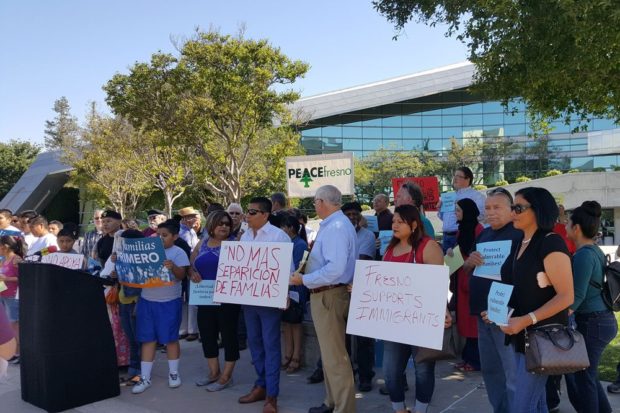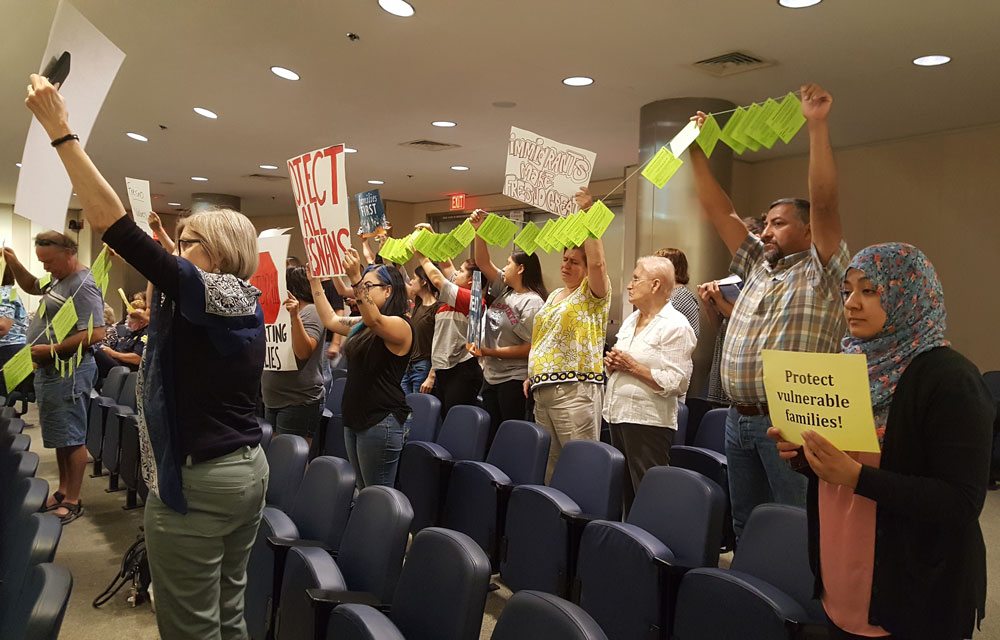
By Daniel O’Connell
In June 2016, Donald Trump launched his bid to be President of the United States with an extraordinary discriminatory anti-immigrant statement: “When Mexico sends its people, they’re not sending their best. They’re not sending you. They’re sending people that have lots of problems, and they’re bringing those problems with us. They’re bringing drugs. They’re bringing crime. They’re rapists.”
Following that opening salvo, and once in office, President Trump has actively sought to institutionalize his divisive rhetoric in government policy and programs. Almost immediately, a travel ban targeting Muslim countries was ineptly issued via executive order causing chaos, confusion and mass protests. His campaign call to “Build the Wall” reinforced the race-baiting tenor of his candidacy with its threats to deport millions of undocumented immigrants.
In this context, news of specific deportations breaking up families and affecting communities has caused anxiety and fear within immigrant neighborhoods leaving vulnerable residents too worried to report crimes and wary even of dropping their children off at school.
Across the country, uncertainty on the actions and intentions of the federal government resulted in numerous municipalities declaring themselves “sanctuary cities.” In response, the City of Fresno did not seek to explicitly identify itself as a protective jurisdiction for its undocumented residents, but rather expressed a passive policy where the city was a sanctuary city in all but name.
In early February, city leaders gathered for a press conference to calm fears and ensure that local police were not going to enforce federal immigration law. Fresno’s Mayor Lee Brand commented, “The only difference between Fresno and other cities who label themselves as ‘sanctuary cities’ are only words with no clear definition. I ask the people today and throughout our community to judge me and the City of Fresno by our actions.”
Yet, the procedures of sanctuary cities have not remained solely passive with stances of noncompliance with federal authorities. Some sanctuary cities have adopted active measures to protect their residents including funding for the legal defense of residents swept up by federal law enforcement officials due to their citizenship status.
Major cities, including Los Angeles, San Francisco and Sacramento, have supported city-funded legal services to help their vulnerable residents with immigration problems. Sacramento, for example, allocated $300,000 to protect residents’ civil rights and alleviate fear within the community at large. Sacramento’s legal aid funds aim to create legal guardianships for children and powers of attorney to protect assets for detained residents.
Although cities such as Sacramento view immigrant legal defense funding as a civil rights issue, Fresno Mayor Brand and some Fresno City Council members limited their considerations to budgetary concerns over the use of $200,000 in taxpayer resources out of a total 2018 budget of $1.138 billion, and omitted findings that undocumented residents contribute more than $50 million in local and state taxes in Fresno County. The proposed City of Fresno legal defense funding would complement already raised private contributions and additional funding being budgeted through the State of California.
During recent debate on proposed funding for a legal defense fund, the Fresno City Council heard testimony by city residents on June 14. Numerous community leaders from churches, diverse faith communities, immigrant rights groups, labor unions and residents—including those of Japanese descent who recalled their World War II internment—overwhelmingly supported the funding. Only a single person spoke in opposition to the funds.
In the end, Council Member Esmeralda Soria, with the support of Oliver Baines, successfully introduced the fund to be considered in the city’s budget. A week later, the proposal was voted out of the final budget with only Soria and Baines supporting it. During City Council debate, the framing of U.S. history with respect to immigration, race and segregation offered a backdrop to the positions of Council members and informs the larger contexts in which Fresno finds itself today.
In California, sensitivities to racist exclusions, particularly those around immigrant labor populations, are high due to historic precedent. As early as the 1870s, “alien land laws” in various forms effectively barred immigration, limited voting rights and eliminated rights to land ownership primarily by targeting Chinese and Japanese residents. These laws were only ruled unconstitutional by the Supreme Court in 1952.
Later, in the 1930s and 1940s, mass deportations of Mexicans and Mexican Americans were coded as “repatriation campaigns” and were particularly prevalent in California. In Los Angeles, for example, local authorities coordinated “scarehead” initiatives to terrorize immigrant neighborhoods. Raids occurred at workplaces and public spaces to distill fear in Mexican barrios.
Upward of two million people were deported or expelled and families were permanently torn apart in what amounted to an early version of ethnic cleansing. Significant to today’s context, most deportees were unconstitutionally denied their legal rights of due process and equal protection under the law, even though more than half of those targeted were legal U.S. citizens.

Finally, the most commonly referenced, race-based and illegal action against an immigrant community was the forced relocation and internment of Japanese residents in concentration camps in the western United States during the Second World War. The action was the result of an executive order by President Franklin Roosevelt and affected approximately 120,000 people of Japanese ancestry. In 1988, President Ronald Reagan acknowledged that actions of the U.S. government at the time were based on “race prejudice, war hysteria and a failure of political leadership.”
This history and prevalence of racial discrimination, segregation and exclusion in American society, and particularly in California, heighten the need for vigilant attention and proactive measures from local government during an era when xenophobia and intolerance are promoted by the executive branch of the country. Without action, the past teaches us that a cascade of infinitesimal infractions on public norms can build to a crescendo.
The lessons of Germany inform our need for community solidarity. On Nov. 9, 1938, “Kristallnacht” occurred across Germany. Prior to that date, following the rise of the Nazis in 1933, violations of civil rights and incursions on public mores of tolerance had been mostly nonviolent but were increasingly severe. After Kristallnacht, however, the gates to the concentration camps opened and extraordinary violence became public policy.
What the lessons of German history lay out before residents of the United States today is that between January 1933 and November 1938, there were thousands upon thousands of infringements upon the rules of social solidarity and community that played out in small dramas before German society in stores and schools, synagogues and churches. At what moment should any German citizen or local elected official have stood between the state’s bigotry and their scapegoated neighbors?
Given Mayor Brand’s public vow in February to let actions speak as the city’s promise to its residents to defend their immigrant neighbors, it is now incumbent upon him to propose a similar or stronger policy to those now offered by sanctuary cities in California to defend the civil rights of its vulnerable residents, families and communities.
*****
Daniel O’Connell, Ph.D., is the executive director of the Central Valley Partnership.
